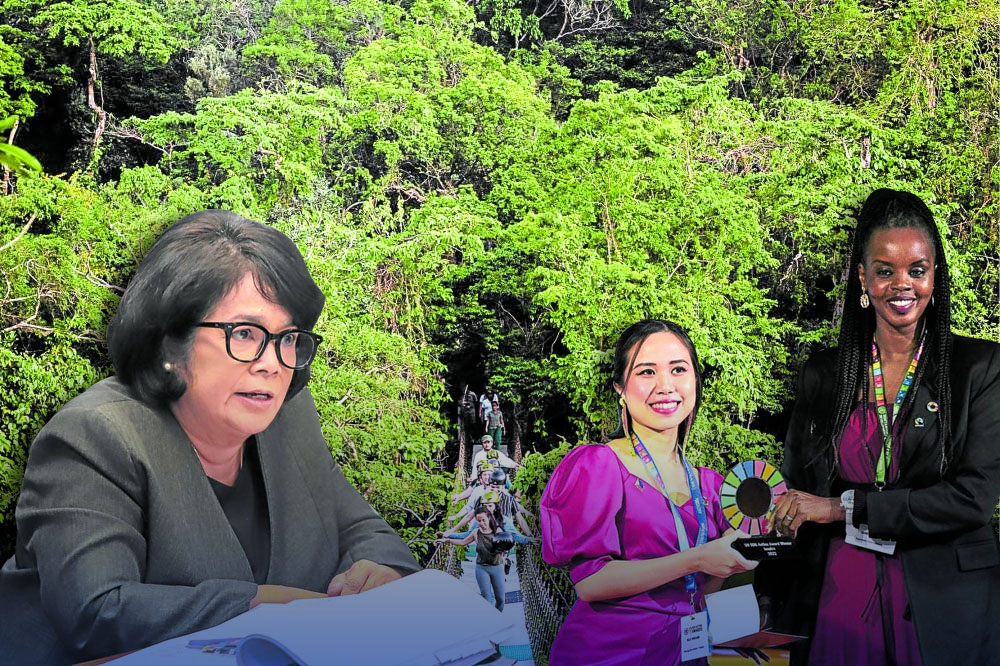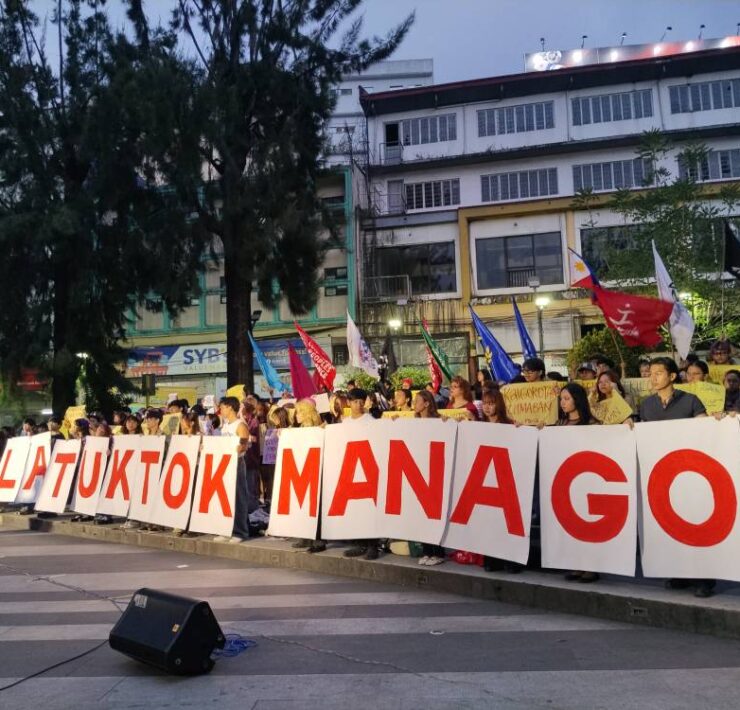DENR to evict developer of Masungi Georeserve

- Blue Star Construction and Development Corp. has been given 15 days, without extension, to leave the area after the DENR unilaterally nullified its nearly 23-year-old contract with the company.
- The original DENR-Blue Star agreement involved the survey, design, financing, construction, development and marketing of a low-cost housing project, to be called Garden Cottages, with 5,000 townhouses and single detached homes within a 130-hectare state property in Tanay. It was then signed by then Blue Star president Manuel Chua and then Environment Secretary Victor Ramos.
- According to MGFI, the aim of the 1997 JVA was to create a sustainable housing project with 70-percent green spaces and 30-percent development for government employees and stop rampant land speculation in the area.
- Among the “defects” of the agreement, the DENR said, was that no “regular procurement or bidding process” was supposedly held for the proposed construction of the housing units on Lot 10.
The Department of Environment and Natural Resources (DENR) on Friday said it was evicting a private housing developer from the forests of Rizal province, a move that could terminate the multiawarded conservation work of the Masungi Georeserve Foundation Inc. (MGFI) in the protected area.
In a letter, Environment Undersecretary Juan Miguel Cuna gave Blue Star Construction and Development Corp. 15 days, without extension, to leave the area after the DENR unilaterally nullified its nearly 23-year-old contract with the company.
Cuna cited alleged “legal infirmities” of the DENR’s 2002 supplemental agreement (SA) to its 1997 joint venture agreement (JVA) with Blue Star, which expanded a 130-hectare area to build homes for thousands of government employees with an additional 300 ha of land known as “Lot 10,” which is covered by the MGFI conservation site.
The March 7 notice was addressed to Ben Dumaliang, the president of Blue Star, which established the nonprofit MGFI in 2016.
The foundation’s work includes reforestation and protection of the unique and fragile limestone formations within the total 430-ha protected area, which is also home to hundreds of plant and animal species. The site has been attracting tourists and environmentalists over the years.
Original agreement
The original DENR-Blue Star agreement involved the survey, design, financing, construction, development and marketing of a low-cost housing project, to be called Garden Cottages, with 5,000 townhouses and single detached homes within a 130-hectare state property in Tanay. It was then signed by then Blue Star president Manuel Chua and then Environment Secretary Victor Ramos.
The land title of Lot 10 was initially in the name of the Republic of the Philippines before it was transferred to the Bureau of Corrections and the DENR.
A supplemental agreement on Nov. 15, 2002, was inked by then DENR chief Heherson Alvarez and then Blue Star president Lamberto Tagayuna to expand the housing site, from 130 ha to 430 ha under a masterplan that should minimize any disruption in the ecosystem while preserving and enhancing the land’s “natural attractions.”
Housing for gov’t staff
According to MGFI, the aim of the 1997 JVA was to create a sustainable housing project with 70-percent green spaces and 30-percent development for government employees and stop rampant land speculation in the area.
In 2006, another agreement was signed to amend the implementation of Garden Cottages to five more years, or until 2011.
But DENR, under Secretary Maria Antonia Yulo-Loyzaga, is calling the 2002 contract “illegal” for “lack of essential elements and failure to go through a bidding process.”
Among the “defects” of the agreement, the DENR said, was that no “regular procurement or bidding process” was supposedly held for the proposed construction of the housing units on Lot 10.
“To comply with (Commission on Audit) rules and regulations, and existing jurisprudence, it is required that a separate bidding be conducted since the 2002 SA has land larger than the subject area of the original JVA,” read Cuna’s eight-page letter.
Not for renewal
Asked why Cuna signed the letter as “officer in charge” of the Office of the Secretary, the DENR said Yulo-Loyzaga was on “personal leave” but didn’t say how long she would be away.
Cuna also pointed out that because there were “no substantial housing units built” on the site within the agreed implementation period, the contract had “no basis” and “should not be renewed.”
The agreement should also be canceled due to the absence of a “compulsory” presidential proclamation to declare Lot 10 “open for disposition” for the project.
These reasons make the 2002 contract void ab initio, or from the start, the DENR pointed out.
Out to ‘silence advocates’
A “web of violations” was also cited by Cuna, including the imposition of fees “not provided in the Masungi Rock Eco-Tourism Plan;” fencing of a portion of Lot 10; and “very restrictive access” given to DENR representatives.
But MGFI said in a statement that the DENR’s contract revocation was “part of a larger, more insidious effort to weaken environmental protection, silence advocates, and clear the path for selfish commercial interests to exploit our natural resources.”
It said it had anticipated the DENR’s move and vowed to expose the department’s “decadeslong negligence in managing these contracts” through legal action.
“We are confident of the legal remedies available to us to stay the order, continue our work, and save Masungi,” the group said. “We welcome the opportunity to defend this agreement.”
Billie Dumailang, cofounder and one of the trustees of the foundation, told the Inquirer that MGFI’s statement “shall cover Blue Star’s initial reactions for now.”
On the alleged invalid components of the agreement, MGFI disputed the DENR’s allegations, saying that the project was “competitively bidded out” and that the area expansion under the SA was legal.
“This expansion is based on the provisions of law, which allows a government project to be expanded or extended without additional bidding under certain conditions,” it said.
Failure on DENR’s part
According to MGFI, it was the DENR who was at fault for “stubbornly refus[ing] to carry out its contractual obligations to clear the area of large-scale illegal occupants, liens and encumbrances, causing delays to the project and significant injury to its private sector partner.”
More than abiding by the contracts, it added that the project was a “collaborative partnership where both parties—the financier and developer (Blue Star) and the landowner (DENR)—share responsibilities, obligations and equity.”
“As outlined in the contract, disputes should be resolved through good-faith dialogue between both parties,” the foundation said.
It feared for the Masungi Georeserve defenders whose safety would be undermined by the DENR’s move.
Internationally recognized
Masungi Georeserve has won various awards, including the World Commission on Protected Areas International Ranger Awards, United Nations Sustainable Development Goals Action Awards (Inspire Category), and the Sustainability Initiative Award by Bett Asia Awards, all in 2022.
Its other recognitions include Special Commendation in the Pathfinder Award for Innovations for Conservation Financing and Resourcing and the WIN WIN Gothenburg Sustainability Youth Award in 2020. It was also a finalist for the 15th Tourism Awards by the United Nations World Tourism Organization and Destination Stewardship in the Tourism for Tomorrow Awards by the World Travel and Tourism Council.
In 2021, Billie and her sister Ann won in Vanity Fair’s 2021 Changing Your Mind Travel Awards. The Masungi conservation park placed first in the Water ChangeMaker Awards by the Global Water Partnership in the same year. —WITH A REPORT FROM INQUIRER RESEARCH





















